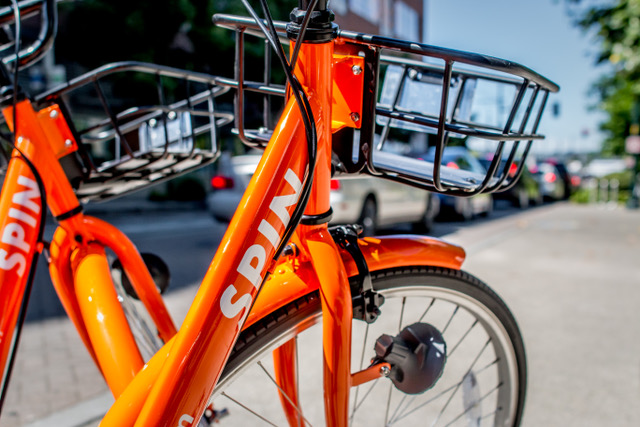Spin brings its pick-up-anywhere bike sharing to South San Francisco

Spin, the bike-sharing service that lets you pick up and drop off a bike anywhere in a city, is coming to South San Francisco.
The company’s dockless bike-sharing service made its debut in Seattle last week, and is now spinning its way down south to the Bay Area.
“We are in close talks with them and should be launching in a matter of weeks,” says Spin chief executive and co-founder Derrick Ko.
South San Francisco is the first of five or six new markets that Spin will be rolling out to in the next few months, Ko says.
It’s further proof that the company has been doing far more than spinning its wheels (forgive me?) since it raised $8 million in financing this May.
Investors in that financing included Grishin Robotics, which was joined by Exponent.VC, CRCM and angel investors Matt Brezina and Charlie Cheever.
Ko said the goal was to launch in population centers that would allow it to deliver its dockless bike service to around 6 million people before the end of the quarter (the company has been talking with folks in New York City, too — and that alone could get it over the 6 million threshold).
Spin’s machinations come as bike sharing looks to be a big business globally, and the biggest players from China are already expanding into other markets (ahem… the U.S.). Ofo has raised over $700 million for its global expansion plans and shows no sign of slowing down its fundraising or expansion plans. Its chief competitor, Mobike, had raised $600 million one month before.
American competitors are also making their own moves, like New York-based Social Bicycles, or SoBi, which says it was first in producing a dockless bike that features a trackable GPS system and an integrated lock that allows it to be parked at any bike rack in a city.
Spin boasts a similar technology and an expanding geographic footprint. Within two days of the Seattle launch, Spin had already seen its bikes taken for 1,000 rides.
Unlike businesses like Motivate, which charge cities for their docked bicycle-sharing services, Spin doesn’t charge cities for their dockless bike-sharing services. The company pays fees off its commissions into cities, Ko said. “That’s how we look at it. It’s a fundamentally different business model,” he said.
The model also differs from that of the Chinese companies that are coming into the U.S. While Mobike and others have pursued a more Uber-like path by coming into the city without really consulting with city governments, Spin has tried to work with the cities it’s entering.
“A playbook that works overseas does not necessarily work in the U.S.,” says Ko. “Going out and dumping bikes on the street does not work in the U.S. It’s a playbook that a lot of Chinese companies typically use. Thy don’t understand the nuances of how to work with — and in — cities.”